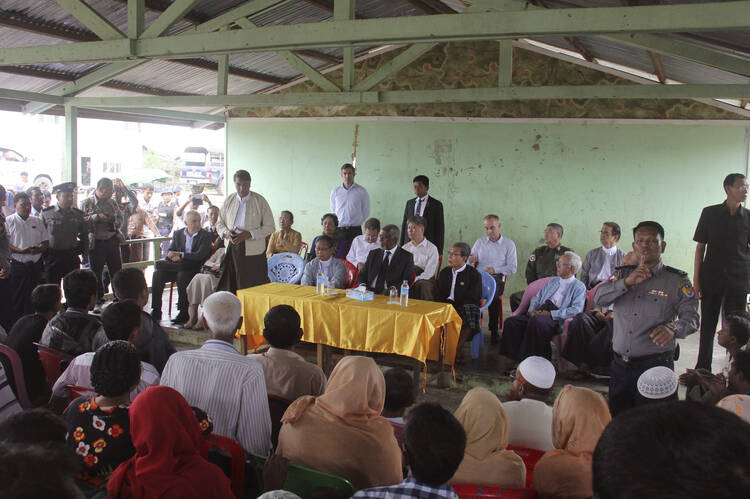Members of Myanmar's Muslim Rohingya minority expressed hope on Sept. 7 that a visiting panel led by former U.N. chief Kofi Annan will help end the discrimination and violence they face at the hands of the country's Buddhist majority.
Annan is a member of an independent commission set up last month by State Counselor Aung San Suu Kyi's government to help find solutions to a communal conflict in the western state of Rakhine that has seen widespread abuses and violence by Buddhists against Rohingya.
Many Buddhists in Rakhine and across Myanmar consider Rohingya to be Bangladeshis living in the country illegally, though the ethnic group has been in Myanmar for generations. Hundreds of Rohingya were killed and tens of thousands forced to flee their homes in 2012 unrest in Rakhine state, and many continue to be confined to squalid camps there.
Rohingya residents, including community leaders who met Wednesday with Annan, said they have faith in the nine-member advisory commission headed by the former U.N. chief. Members of the Rakhine community, however, protested Annan's arrival on Tuesday, saying they oppose foreign meddling.
Annan on Wednesday visited the Rohingya community in the Aung Mingalar quarter of Sittwe, where Muslims are kept in a gated area and not allowed to go outside. Annan later visited Rakhine and Rohingya camps in Thetkabyin village outside of Sittwe. More than 100,000 people in Rakhine state live in displacement camps, the majority of them Rohingya who were forced to flee their homes after the 2012 rioting. Outbreaks of violence directed by Buddhists against Muslims later spread to some other areas of Myanmar, but were generally contained.
Journalists were not allowed to attend the community meetings, but some people who participated described them afterward.
Aung Thein, a leader of the Aung Mingalar community, said the commission members spoke of their ideas for Rakhine's future and hopes for cooperation from all sides.
"We trust this commission. We trust any organization that is trying to help us here and we welcome them here," he said.
A fellow community leader, Hla Kyaw, said he believes Annan's panel "will be a fair commission because they have included Buddhists and Muslims in the commission. What we want is to live together as brothers and sisters in this community. We don't know if the Rakhine community will ever accept living together as before."
"Because of the conflict, we have been suffering for more than four years," he said. "We really welcome that Kofi Annan is leading the Rakhine Commission and we trust that they will be able to solve the long, complex situation here."
In a six-day trip, the commission is supposed to address human rights, ensuring humanitarian assistance, rights and reconciliation, establishing basic infrastructure and promoting long-term development plans.
Copyright 2016 The Associated Press. All rights reserved. This material may not be published, broadcast, rewritten or redistributed.








